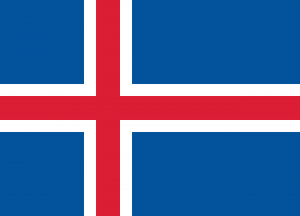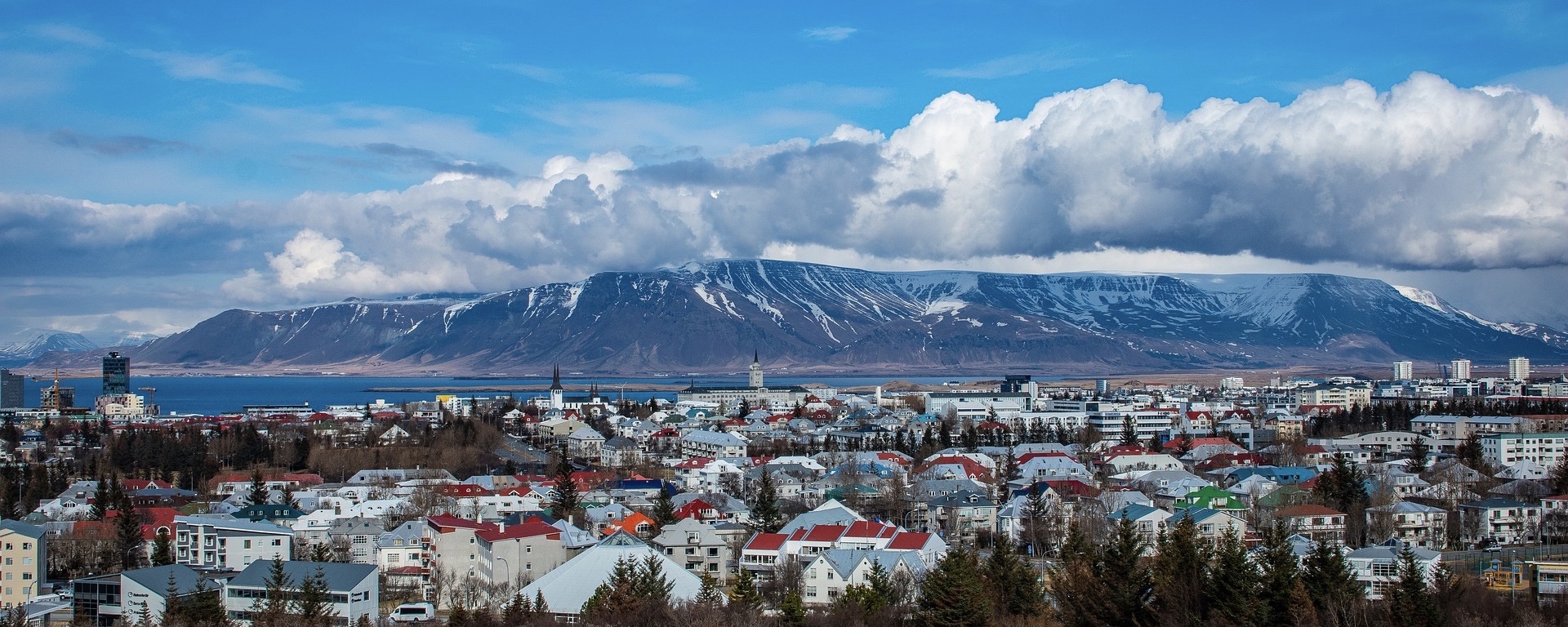Language/Icelandic/Culture/Iceland-Timeline
Jump to navigation
Jump to search
Rate this lesson:
Historical Timeline for Iceland - A chronology of key events
Iceland Timeline[edit | edit source]
| Date | Event |
|---|---|
| 8th century | Discovery of Iceland by Irish monks. In Hella, in the southwest, caves attest to the presence of hermits. |
| 865 | A Viking from Sweden reaches Iceland. |
| 874 | Ingólfur Arnarson, a Viking from Norway, winters on the southwest coast then settles in Reykjavík. It was the beginning of the colonization of Iceland by the Norwegian Vikings, forced into exile to escape the tyranny of King Harald I "with the beautiful hair". |
| 930 | A parliament of regional chiefs, the Goðars, meets in Þingvellir in the southwest. The Alþing, which now sits every spring, sets laws and settles disputes, in fact holding federal power. |
| 985 | Erik the Red discovers Greenland and establishes an independent colony there, which will organize a prosperous trade with the rest of the Scandinavian world for four centuries before disappearing into oblivion. |
| 1000 | Despite local reluctance, the Alþing quickly imposed Christianity as the official religion. Leif l'Heureux, son of Erik the Red, reached the coasts of North America, which he called Vínland (wine country). However, the hostility of the Amerindians will prevent attempts at colonization. |
| 1100 approximately | Thanks to Christianity, slavery disappears from the island. |
| 1120 circa | Scripture of the Íslendingabók (Book of the Icelanders). |
| Circa 1225 | Heimskringla writing (History of the kings of Norway). |
| 1230-1262 | Period of the Sturlungar clan during which the main sagas, accounts of colonization and clan struggles were written. Snorri Sturluson assassination in 1241. |
| 1262-1264 | End of the country's most brilliant period. Following the struggles between different clans, Iceland loses its independence and falls under the yoke of Norway. It is the beginning of the dark period of Icelandic history: epidemics, natural disasters, wars and famines follow one another. |
| 1380 | Iceland becomes Danish with Norway. |
| 1402-1404 | The black death (plague) ravages Iceland. |
| 1551 | The king of Denmark, Christian III, imposes Lutheranism on the population of the island, which has the effect of intensifying the struggles of rival clans. |
| 1602 | Denmark establishes a commercial monopoly with Iceland. The numerous Hanseatic and British sprains maintain an atmosphere of conflict. |
| 18th century | Economic stagnation and demographic decline are worsening. Denmark, at war, cannot meet local needs |
| 1660-1665 | The Alþing loses its legislative power and becomes a simple tribunal. The Danes indeed impose an absolutist power. |
| 1707 | Smallpox attacks the island. |
| 1783-1784 | The eruption of the Lakagígar decimates part of the fauna and the population. |
| 1845 | The King of Denmark reinstates the Alþing as a consultative chamber which had been abolished in 1801. |
| 1854 | The Danish monopoly on Icelandic trade is abolished. |
| 1874 | Under pressure from nationalist movements, the Danish Crown grants Iceland its own Constitution. |
| 1880-1914 | Many Icelanders migrate to Canada and the United States due to harsh economic conditions. |
| 1904 | Autonomy statute. |
| 1906 | A telephone cable links Iceland to Scotland. |
| 1908 | Right to vote for women at the local level. |
| 1915 | Voting rights for women to elect deputies. |
| 1918 | Semi-independence: the King of Denmark remains the sovereign of the island. |
| 1920 | Appearance of the Supreme Court. |
| 1944 | Cut off from Denmark, the Icelandic Republic, supported by the Americans for whom the island serves as a military base, is proclaimed at Þingvellir on June 17. |
| 1946 | Iceland joins the UN. |
| 1949 | Iceland is one of the founding members of NATO. |
| 1956 | The Alþing is refused the withdrawal of American troops from Icelandic territory by NATO. |
| 1958 | Herring crisis which disappears from the Icelandic coast. The limits of territorial waters are widened from 3 miles (5.5 km) to 12 miles. "Cod war" with the British who persist in fishing in the area. |
| 1963 | Birth of a new island, Surtsey, following an underwater volcanic eruption off the Icelandic coast. |
| 1971 | Restitution by Denmark of the old manuscripts of the sagas. |
| 1972 | Extension of the exclusive fishing zone to 50 miles, again drawing the disapproval of the English. |
| 1973 | Temporary rupture of diplomatic relations between London and Reykjavík after a British trawler was sent to the bottom. |
| 1973 | Volcanic eruption and evacuation of the Vestmann Islands. |
| 1973 | Presidents Nixon and Pompidou meet in Reykjavík. |
| 1974 | Inauguration of the circular route n ° 1, allowing to go around Iceland. |
| 1975 | The limits of the territorial waters are again widened (200 miles / 370 km). The result is a new "cod war" with Great Britain. |
| 1976 | The tenth cod war, since the fifteenth century, is won by Iceland against the English. |
| 1980 | Vigdis Finnbogadóttir becomes the first woman in the world to be democratically elected President of the Republic. She was re-elected three times, in 1984, 1988 and 1992. |
| 1989 | End of the beer ban in Iceland. |
| 1993 | Ban on whaling, moratorium confirmed in May in Kyoto. |
| 1994 | Iceland is part of the EEA (European Economic Area). |
| 1996 | Gigantic flood (jökulhlaup) of the desert plain to the south of Vatnajökull, following a subglacial volcanic eruption, and cut-off of circular road n ° 1. |
| 1998 | Fishing agreements with Norway, Russia, the European Union and the Faroe Islands for herring, and with Norway and Greenland for capelin. |
| 1999 | The Icelandic Parliament gives the private company DeCode Genetics (which works with Hoffmann-Laroche) access to genetic, medical and genealogical data of the country's population. Lifting of the ban on whaling. |
| 2000 | Eruption of the Hekla volcano on February 26, followed by two imposing earthquakes on June 17 and 21. |
| 2001 | Iceland is one of the Schengen countries. |
| 2002 | Iceland becomes a member of the IWC (International Whaling Commission), a whaling regulatory body. |
| 2003 | IBM makes an agreement with the company DeCode Genetics to sell the Clinical Gene Miner software. |
| 2004 | Ólafur Ragnar Grímsson begins a third term. |
| 2004 | Eruption of the Grimsvötn volcano (November). |
| 2005 | Iceland grants Icelandic nationality to chess player Bobby Fischer. Unnur Birna Vilhjámsdóttir becomes Miss World. |
| 2006 | The American army announces its withdrawal from Icelandic territory after 55 years of presence. |
| 2007 | End of the construction of a huge and much contested dam north of Vatnajökull. |
| May 2008 | For lack of an adversary, the presidential election does not take place and President Ólafur Ragnar Grímsson continues his mission. |
| August 2008 | The men's handball team wins the silver medal at the Beijing Olympics (23-28 loss against France) - a historic achievement. |
| Autumn 2008 | Beginning of the economic crisis which seriously affects the country very "focused" for several years on the speculative economy. The government is nationalizing the country's three big banks and asking for help from the international community. |
| January 2009 | Faced with the demands of the population, Prime Minister Geir Haarde announces his resignation. A new left-wing government, with the support of the Greens, is put in place. The replacement Jóhanna Sigurðardóttir is the first openly homosexual woman appointed to this post. |
| 2010 | April: Airports around the world are paralyzed due to the eruption of the Eyjafjöll volcano, air traffic will be totally disrupted for nearly 15 days. |
| March 2010 | The "no" is in the majority in the referendum organized to adopt a law providing for the repayment of part of the debt contracted by the online savings bank Icesave for the benefit of the United Kingdom and the Netherlands. |
| 2011 | A new constituent assembly of 15 men and 10 women is elected. |
| April 2011 | New referendum on Icelandic debt, the "no" remains in the majority. |
| 2012 | The country is managing the crisis and its decisions have led it to see positive figures from the start of 2011. In 2012, the results are still positive and the country is cited as an example by many economists around the world. Olafur Grímsson, President of Iceland since 1996, was re-elected for the fifth consecutive time in June. |
| 2013 | Iceland's economic recovery is confirmed (growth of 2.8%, unemployment down to 5.4%), but the country still remains heavily dependent on exports and the euro zone. The consolidation of public finances and the restructuring of private sector debts remain incomplete and fragile. |
| April 2013 | The right-wing opposition wins the legislative elections. Sigmundur Gunnlaugsson of the Progress Party is appointed Prime Minister. |
| August 2014 | The Bárðarbunga wakes up, without major consequences. Scientists fear, however, an eruption under the glacier covering the volcano, which would cause powerful flooding (jökulhlaup) and ash fallout. |
| April 2016 | Three months after his election, Prime Minister Sigmundur Gunnlaugsson resigns after being implicated in the Panama Papers scandal. |
| June 2016 | The national football team makes history after reaching the quarter-finals of the Euro, notably eliminating England in the round of 16. |
| December 2016 | Tourism-related statistics are soaring: with less than 1 million visitors in 2014, the country has increased its tourist attendance by nearly 70% in 2 years, with nearly 1.7 million visitors in 2016, and more than 2 million in 2017. And yet, the Icelandic krone also exploded by 20% against the euro in 2016 alone. |
| October 2017 | The early parliamentary elections see the victory, without an absolute majority, of the Independence Party. Following tripartite negotiations, a coalition government, led by Katrín Jakobsdóttir (Ecological Party), is established. |
| June 2018 | Iceland participates for the first time in its history in the FIFA World Cup, organized in Russia. |
Source[edit | edit source]
- https://fr.wikipedia.org/
- https://www.petitfute.com/p57-islande/guide-touristique/c31635-histoire.html
World Timelines[edit source]
Videos[edit | edit source]
The Uniqueness of Icelandic Horses | Equestrian World - YouTube[edit | edit source]
Handmade Icelandic Sweaters - YouTube[edit | edit source]
Other Lessons[edit | edit source]
- Geography
- Literature and Arts
- Religion
- People
- Dress Code and Age Limit for Partying
- Climate
- The best nightlife spots in Reykjavík
- Economy
- Names
- Government
- Dialects
- Djammið How to Party in Reykjavík
- History


